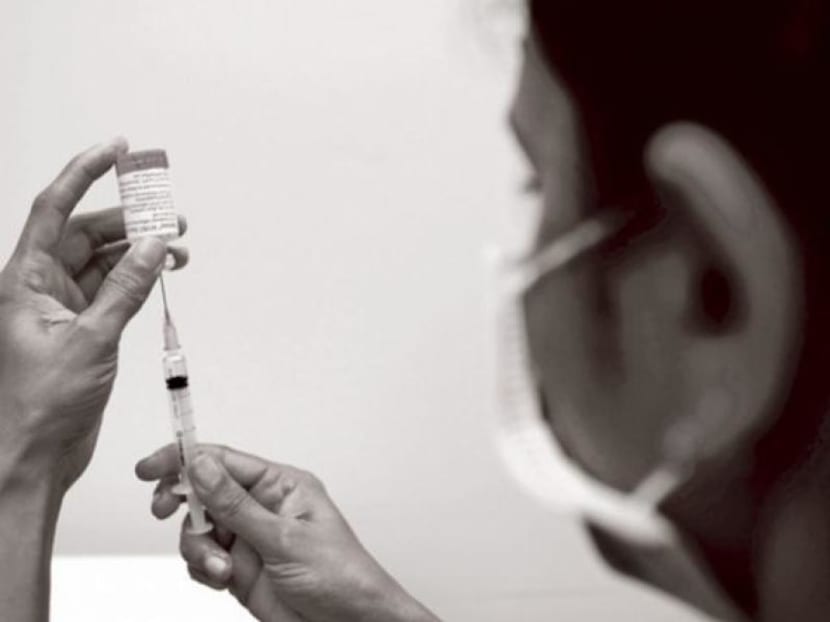National strategy launched to halt the march of drug-resistant bacteria
SINGAPORE — To stop the threat of drug-resistant bacteria from spiralling out of control, the authorities announced a national strategy on Wednesday (Nov 1) that will cut improper use of antibiotics in humans and locally farmed animals.
SINGAPORE — To stop the threat of drug-resistant bacteria from spiralling out of control, the authorities announced a national strategy on Wednesday (Nov 1) that will cut improper use of antibiotics in humans and locally farmed animals.
Announcing the launch of the National Strategic Action Plan on Antimicrobial Resistance nearly a year after work on it was first reported, Senior Minister of State for Health Lam Pin Min stressed the need to take action now.
“The extreme scenario of antimicrobial resistance – of having no effective antibiotics to treat infections – will bring us to a post-antibiotic era where simple infections may kill. Even today, there exist infections that do not respond to many treatment options,” said Dr Lam at a public-health dialogue on the subject at the National University of Singapore.
Antimicrobial resistance occurs when disease-causing microbes, such as bacteria, viruses or parasites, grow resistant to the effects of medicine that used to be able to kill them.
Guidelines on appropriate use of antibiotics and other antimicrobial medicines in primary care clinics and community settings will be issued. Local studies have found that the majority of primary care doctors believed antibiotics are over-prescribed in primary care. Incentives could be offered to encourage doctors to optimise antimicrobial use, according to the plan.
The topic will be expanded in undergraduate and postgraduate training of doctors, and the authorities will also organise campaigns to educate the public on the myths and bad practices of antibiotics use. Messages will include the fact that antibiotics do not work for viral infections.
Professor Teo Yik Ying, Vice-Dean of Research and Dean-Designate at the NUS Saw Swee Hock School of Public Health, said it is important for both general practitioners (GPs) and individuals to know when not to prescribe or request for antibiotics.
The authorities need to “send a message” to GPs and polyclinics that they should not prescribe antibiotics just because patients ask for it, he noted.
When dispensing antibiotics, doctors should also remind patients to “follow the regulations and instructions on finishing the course of antibiotics, and not to stop the course whenever a patient feels better”, he added.
Antimicrobial resistance is a problem worldwide.
Globally, 480,000 people develop multi-drug resistant tuberculosis each year and drug resistance is starting to complicate efforts to tackle malaria and the AIDS-causing human immunodeficiency virus, according to the World Health Organisation.
The Infectious Diseases Society of America estimates that half or more of outpatient antibiotic prescriptions for some common infections are unnecessary or inconsistent with current guidelines.
Agencies in Singapore have some measures in place but the national plan identifies “priority areas” that involve more work and research.
For instance, all public acute hospitals have had antimicrobial stewardship programmes since 2011 to guide doctors in making appropriate choices, but the programmes will be reviewed to be more effective.
Surveillance of drug-resistant infections will be stepped up to include private hospitals and the community, instead of only public hospitals.
And in food production, the Agri-Food and Veterinary Authority (AVA) routinely tests animal feed, meat, dairy products, eggs and egg products, honey and drinking water for antibiotic residues. It will strengthen this by ensuring test methods remain relevant.
To do risk assessments, more data and studies will be needed. For instance, humans can be exposed to drug-resistant organisms in the food chain but the agencies said “more clarity is needed”.
“Little is currently known about the occurrence, effects, biodegradation and significance associated with the release and accumulation of antimicrobials in the environment,” the plan noted. “There is a need to understand how antimicrobials (including disinfectants) may contribute to the selection and spread of drug-resistant organisms in the natural environment and throughout the water and used-water treatment processes.”
One way of prevention and infection control is through immunisation.
The MOH introduced the National Adult Immunisation Schedule last month and will monitor vaccine uptake.
Professor Teo said vaccinations would greatly aid in the fight against antimicrobial resistance, being “a first-line defence” against preventable infections. The authorities will also promote the use of vaccines in livestock, pets and fish, to reduce reliance on antimicrobials. This will involve parties such as pet owners, vets and farmers.
Details on goals for the next five years, measures and ways to monitor outcomes will be developed, stated the plan by the One Health Antimicrobial Resistance Workgroup comprising the Ministry of Health, AVA, National Environment Agency and national water agency PUB.









